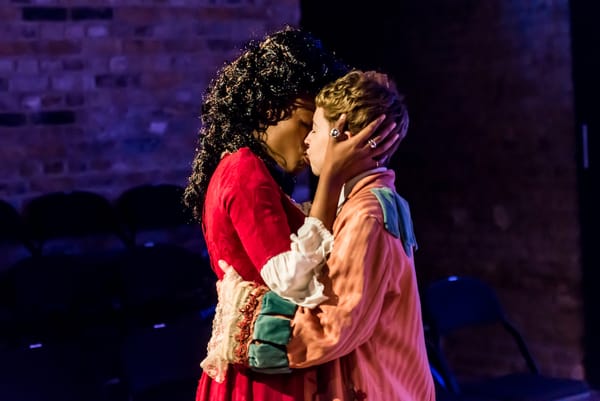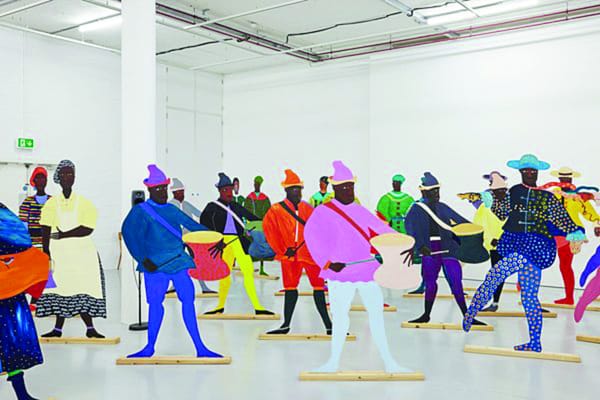Antony and Cleopatra review — Antony Byrne and Josette Simon have fantastic chemistry in Royal Shakespeare Company staging
A traditional production performed by an ensemble without a weak link

This production of Antony and Cleopatra forms part of the Royal Shakespeare Company’s Rome MMXVII season and is one of four plays being performed at the Barbican Centre this winter. It continues the story told in Julius Caesar—also being performed at the Barbican this season —Octavius Caesar, Mark Antony, and Lepidus have avenged Caesar’s death in Rome and established their rule. Whilst Octavius and Lepidus are in Rome, Antony is in Egypt and has become enamoured of the Egyptian queen, Cleopatra, and becomes neglectful of the problems of Rome, including a rebellion against Octavius by his own brother and wife.
Antony Byrne and Josette Simon have a fantastic chemistry as the play’s titular characters, establishing the intensity of their connection from the very opening scene. Byrne’s Antony is ever the soldier, he holds himself with a self-assured dignity, whilst capturing his feelings for Cleopatra and his consequent vulnerability. Simon’s take on Cleopatra is interesting, to say the least. She plays the Queen as coquettish and whimsical with a heavy focus on humour. This lends a child-like quality to her infatuation with Antony and adds an interesting dimension to the power she so clearly holds over him.
When Octavius calls Antony back to Rome to help thwart an uprising from Pompey, it becomes clear the friendship between Octavius Caesar and Antony is now increasingly strained. Antony is seen to be neglecting his duties to Rome, having been holed away in Egypt while even his own wife and brother attempt to rise against Octavius. This sets the stage for the upcoming conflict between them. Ben Allen is excellent as Octavius Caesar; he conveys the sense of his power but also his youth in relation to Antony. Where Bryne’s Antony is steadfast, Allen’s Octavius is intensely emotional and each verse conveys the complexity of his feelings towards Antony: both the respect he holds for his friend and his sorrow at Antony’s betrayal is apparent.
The rest of the cast match the leads; this is a powerful ensemble with no weak link. The key players in Rome, including Patrick Drury as Lepidus, and James Corrigan as Agrippa are faultless—they contribute to the powerful atmosphere of this production’s Rome and beautifully complement Allen’s Octavius. In Egypt, Kristin Atherton and Amber James are captivating as Cleopatra’s maids Iras, and Charmian respectively- they feed off Simon’s interpretation of Cleopatra and heighten her moments of melodrama. Despite being relatively minor characters, they really stand out in this performance and form a great part of the allure of Egypt over Rome.
This is a very traditional staging of Antony and Cleopatra, complete with period costumes. Although inspired takes on Shakespeare with different settings or modern takes are exciting, in no way did this version feel inadequate or tired. The Barbican theatre almost seems made for this production- the stage is large and the theatre is a big one with high ceilings allowing it to capture the grandeur of Rome and Egypt, despite the relatively sparse set.
The production isn’t without its flaws: a battle between the fleets of Rome and Egypt is played out using miniature ships, which makes it appear childish and simplistic. Pacing is often not ideal and there are parts where it begins to drag and you become conscious of its 3 hour length. These are all minor complaints though, shortcomings that barely detract from the impact of the performance as a whole.
Ultimately, however, Antony and Cleopatra boils down to its two leads. Antony Byrne really is the star of the show and has complete command of the audience’s emotions. The scenes leading upto Antony’s death are particularly moving, especially the moment where Antony decides to take his own life but cannot bring himself to commit the act. His self-loathing and anger mixed with a wretched sadness really tug at the heartstrings.
Simon’s Cleopatra is, perhaps, less effective. Her whimsical take on Cleopatra makes for an interesting first half, where she captures Cleopatra’s feelings for Antony and her chemistry with Byrne faultlessly. However, her focus on humour and melodrama really let down the second half of the play. She fails to convey Cleopatra’s regality and you don’t get a sense of her power in her interactions with Octavius. As the play approaches its tragic conclusion, Simon’s Cleopatra transforms, becoming more serious and queenly. However, she still reverts to comedy at times, which often feels jarring and out of place. Ultimately Simon’s performance really affects the impact of the play and you’re left with a sense of anti-climax upon the tragic conclusion of Cleopatra’s fate— it’s difficult to feel for the loss of her dignity and power when it has been so uneven in its portrayal.
Antony and Cleopatra
4 Stars
Until 20th January 2018 Barbican Centre Tickets from £10, under-25s £5 (limited availability)








